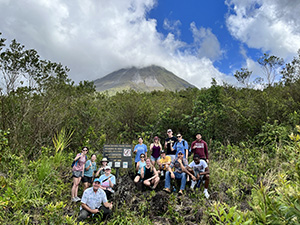By Alex Garriga Podadera, Global Engagement at Texas A&M University
COLLEGE STATION, Texas — October 16, 2025— Dr. Gary Wingenbach teaches international agricultural development at Texas A&M University and has led multiple study abroad programs across Latin America, many of them based at the Soltis Center for Research and Education in Costa Rica.
When Wingenbach talks about the Soltis Center, his voice carries the kind of conviction that only comes from lived experience. Having visited almost 100 times and brought more than 200 students over the years, he sees Soltis not just as an extension of Texas A&M University, but as a vital piece of its educational DNA.
“There’s something about Soltis that gets into your heart,” he said. “It’s safe, it’s welcoming, and it offers a learning environment that simply can’t be replicated on campus.”

Dr. Gary Wigenbach and his group of students studying abroad in Costa Rica while visiting Arenol Volcano.
That sense of safety is deeply meaningful. Wingenbach emphasized that physical and emotional well-being are prerequisites for learning, especially in international contexts.
“Safety is essential. When I take students abroad, I need to know they’re going to be okay,” he said. “At Soltis, I’ve never once doubted that. The staff, the location, the structure, everything is designed to make students feel protected and supported.”
But beyond logistics and infrastructure, what draws him back is the kind of learning that takes root at Soltis. It’s what he calls transformative, high-impact education, a philosophy that emphasized real-world engagement, reflection, and personal growth.
High-impact educational practices are those that deeply engage students in learning, such as study abroad, undergraduate research, and service learning. These practices are known to increase retention, student satisfaction, and post-graduation success.
“In Costa Rica, learning is visceral,” Wingenbach explained. “When students hike through the rainforest, interview locals, or participate in community projects, they engage with the world in a way that changes them. That’s what high-impact education is, it changes lives.”
His approach is deeply experiential. He doesn’t just want students to learn about development theories; he wants them to witness development in action, to interact with the stakeholders, and to grapple with the practical and ethical complexities it entails.
“At Soltis, I’ve watched students grow in ways that no classroom can produce,” he said. “They come back more curious, more empathetic, and more driven to serve.”
He recalled how students often enter the program with a narrow view of global issues but leave with a multilayered understanding of cultural nuances, economic systems, and the interconnectedness of local and global dynamics.
“They get to see development through the eyes of Costa Ricans,” Wigenbach said. That shift in perspective is invaluable. It teaches them humility, adaptability, and the importance of listening.”
One moment that stands out in his memory is when his students collaborated with local communities on a sustainable agriculture project.
“They weren’t just learning about sustainability, they were living it. And that changes you.”
Students worked side-by-side with Costa Rican farmers, explored agroecological methods, and discussed the challenges of balancing productivity with conservation.
“You don’t forget that kind of learning. It becomes part of how you see the world.”
For Wingenbach, the success of Soltis also lies in its people. “The staff are incredible. They know how to support students and faculty while letting the learning emerge naturally. You feel like you’re part of something bigger when you’re there.”
He praised the flexibility and professionalism of the Soltis team, described them as “partners in pedagogy.” Whether it’s organizing a field visit to a local cooperative or managing logistics in the rainforest, the staff enable meaningful learning without getting in the way of it.
As the University looks ahead, he hopes to see Soltis continue to grow, not just in the number of programs it hosts, but in how it fosters global citizenship and leadership. “This isn’t just a place to study abroad,” he said. “It’s a place to rethink what education can be.”
For Wingenbach, Soltis exemplifies the future of higher education: immersive, ethical, community-based, and transformative. It’s a place where students confront real-world challenges and return with not only new knowledge, but a renewed sense of purpose.
And in that sense, Soltis is more than a center; it’s a catalyst for the kind of education that stays with you, long after the rainforest fades from view.
About Global Engagement
The Department of Global Engagement strategically aligns several critical internationally focused units bringing together Education Abroad, International Student & Scholar Services, and Global Partnerships & Initiatives. As a hub of resources and partnerships, Global Engagement fosters the University’s commitment to solving the world’s most pressing problems through a focus on transformational international education and research that serves our local communities and the world at large.
